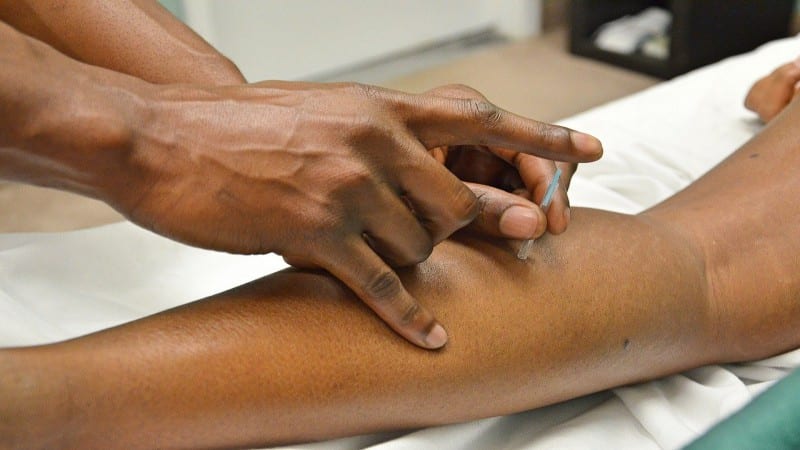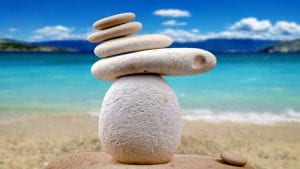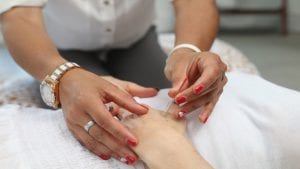Acupuncture is an ancient medical treatment originating in China. For at least 2,500 years, acupuncture has been an integral part of traditional Chinese medicine [1]. Scientific evidence increasingly supports the value of acupuncture. Worldwide, acupuncture is integral to everyday medical practice. In recent decades its practice has gained popularity all over the world [2]. In a series of interviews with a highly cooperative practitioner of acupuncture we want to get a better picture of acupuncture and what it can offer for us.
Acupuncture fills you with energy (chi)
”Doctor Xuefei Wu (http://www.xuefei.fi/main/ ), I am so happy you agreed on sharing your knowledge of acupuncture with us. What are we going to cover? Maybe we will start with the basis of acupuncture? How did acupuncture begin? Is acupuncture scientifically proven? How does acupuncture work in your body? What diseases can be cured by acupuncture? Xuefei, are you feeling tired already thinking of everything you are going to face when a regular biologist is asking questions about acupuncture?”
No, rest assured Christer, I am not going to get exhausted of delivering acupuncture information. Sometimes I get tired when I am just biding-my-time and not practicing acupuncture. When I am busy in my acupuncture clinic I am filled with energy.
We could start with the fundamentally different philosophical basis of acupuncture and traditional Chinese medicine. The core understanding of acupuncture lies in the knowledge of how healing energy is mediated through the small needles. As a matter of fact I believe most of the criticism against acupuncture originates from poor understanding of acupuncture theory and practice.
Christer, think of this tiny little needle inserted into your body. The healing effect is not a product of knowing the exact location of the needle in your body, nor is healing achieved by the acupuncturist himself. The healing process is possible only if the acupuncturist acknowledges that he is only a mediator of universal healing energy.
In Chinese medicine the occurrence of a disease is due to the struggle between the causative agent and the person’s energy or vital-force. If your state of health is excellent then it is very difficult for an infection or some other disease-producing event to overcome the body’s natural defenses.
The basis of acupuncture
”Xuefei, in a humble way you have already from the beginning shown us the structure of our interview. Let us be humble and open-minded about acupuncture, bold and decisive if it is needed. Now, could you for a starter explain for us the basis of acupuncture?”
In Chinese medicine and in this case acupuncture there is always a question of a balance between Yin and Yang. The acupuncturist is observing the patient for various factors, such as examining the tongue, feeling the pulse, paying attention to the patient’s general appearance, answering questions about symptoms and medical history, identifying smells, looking at the way of walking and posture, checking the quality of the skin and hair etc. All these visible signs of health taken together make it possible for the acupuncturist to compose a comprehensive and full diagnose. He tries to understand what is going on in the invisible inner organs and is highly motivated to find the root cause of the disease. All this information is utilized to choose the appropriate acupuncture points and methods for the treatment.
For example, the emphasis on pulse diagnosis is very common in Chinese medicine. The pulse reveals the characteristic balance between Yin and Yang. The acupuncturist must feel the pulse of the radial artery in different positions and at different pressures in order to be able to feel the pulse of each of the 12 inner organs. A skilled pulse-taker can reveal which organs are relatively healthy and which ones are imbalanced to such a degree as to be the cause of symptoms for the patient. The blood itself is considered to reflect the patient’s Yin character and the force of blood flowing inside the blood-vessels show the Yang character. In this way the acupuncturist can figure out the pattern of Yin/Yang harmony. It is possible for an experienced practitioner of Chinese Medicine to get hold of the patient’s full Yin/Yang harmonies for each inner organ!
Differences between acupuncture and Western medicine
”What are the main differences between acupuncture and conventional Western medicine?”
A physician educated in the Western world is examining a patient experiencing for example a difficulty in breathing by giving him/her a diagnose such as asthma. He then prescribes some pharmaceutics making it easier for the patient to breathe. The acupuncturist is looking at the same patient in a different way. He might suspect a deficiency in the energy of the lung or the kidney and even the spleen. However, one should bear in mind that when inner organs of the human body are mentioned in Chinese medicine and acupuncture, their location, morphology, structure and function is not the same as in Western medicine. Both Chinese and Western medicine are practiced in their own ways. It is not that one medical system is correct and the other incorrect. It is just that they both see the symptom through the perception of their own very different medical systems.
The acupuncturist is searching for patterns of disharmony in the patient. This lack of harmony may have caused the problematic symptoms. For instance, insomnia is often considered as disharmony between the heart and kidney. Therefore therapy will focus on balancing the heart and kidney, by acupuncture, with Chinese herbs or making use of a special kind of massage called Tuina.
It was interesting to learn that Chinese medicine differs from Western medicine regarding the conception of all inner organs. Chinese medicine focuses on the abstract functions of the organ instead of objective anatomy (one kidney!).
Can acupuncture be proven scientifically?
”Is it possible to study acupuncture by evidence based methodology? Are there high-quality, randomized, blinded and placebo-controlled acupuncture studies available?”
This is a very good question. There is a continuing finger-pointing on acupuncture that this method cannot be proven scientifically or the scientific proofs are inadequate. This is not true. Acupuncture has been studied a lot (The huge scientific database, PubMed, provides over 32 000 results with the keyword ‘acupuncture’).
The biggest problem is that acupuncture is not yet an integrated part of Western clinical practice. Acupuncture experiments are not as easy to perform as conventional Western medical treatments as acupuncture is a holistic way of treatment involving a lot of personal engagement to be successful. Yet it is possible to study acupuncture experimentally. Anything that produces a physical effect can be tested by evidence-based methodology. In order to be accepted in West acupuncture must be tested by well-known methodology. Otherwise acupuncture will remain in the category of ”other untested methods”. We are right now seeing an enhanced integration of acupuncture into Western medicine.
Important acupuncture literature
”In the forthcoming parts of our interview we will present scientific articles on acupuncture, but could you just as a starter suggest some scientific studies on acupuncture which are important to read?”
I would like to recommend one prominent and widely used book about Chinese acupuncture and moxibustion. The Chief editor of the book is Cheng Xinnong and there is an English version available [3]. The book is highly regarded by the international academic community. It is used as a textbook by the International Acupuncture Training Centers in Beijing, Shanghai and Nanjing. The book incorporates the rich experience of class teaching and clinical practice and the results of acupuncture research, retaining the characteristic features of the traditional theory of acupuncture and stressing the integration of theory and practice.
There is accumulated evidence that acupuncture is beneficial in various conditions. However, the clinical research still needs great improving, while the basic research results need to be appropriately transformed into clinical outcomes. Based on current achievements doctor Yi Zhuang and his team believe that although the challenges and difficulties exist, a more collaborative, innovative, and integrated approach will help to achieve further progress in acupuncture research [4].
References
1 Kristin Vanderploeg, Xiaobin Yi. Acupuncture in Modern Society. J Acupunct Meridian Stud 2(1): 26-33, 2009 https://www.sciencedirect.com/science/article/pii/S2005290109600121?via%3Dihub
2 Tony Y Chon, Mark C Lee. Acupuncture. Mayo Clin Proc 88(10): 1141-1146, 2013 https://pubmed.ncbi.nlm.nih.gov/24079683/
3 Cheng Xinnong (Editor). Chinese Acupuncture and Moxibustion, 3rd Edition, 19th Printing, December 2018
4 Yi Zhuang, Jing-jing Xing, Juan Li, Bai-Yun Zeng, Fan-rong Liang. History of Acupuncture Research. Int Rev Neurobiol 111: 1-23, 2013 https://pubmed.ncbi.nlm.nih.gov/24215915/
![]()



